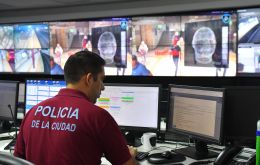MercoPress. South Atlantic News Agency
Tag: facial recognition
-
Saturday, October 10th 2020 - 09:20 UTC
Controversy in Buenos Aires City over live facial recognition to identify minors

Human Rights Watch wants the city of Buenos Aires to stop using live facial recognition to identify children accused of committing crimes, the rights group said on Friday. New York-based Human Rights Watch said Buenos Aires started using the technology in 2019, making Argentina the only country in the world to deploy it against people under the age of 18.
-
Friday, June 26th 2020 - 09:24 UTC
UN human rights office calls for moratorium in use of facial recognition technology

The UN human rights chief called on Thursday for a “moratorium” on the use of facial recognition technology during peaceful protests, stressing that it could increase discrimination against people of African descent and other minorities.
-
Tuesday, May 14th 2019 - 08:45 UTC
Brazil will ban violent foreign fans from the Copa America next month

Copa America hosts Brazil will stop known violent foreign fans from entering the country for the South American football tournament starting next month, officials said on Monday. Troublesome supporters identified by border control and immigration officers will be turned back, the justice and public security ministry said. The order takes immediate effect.
-
Saturday, April 6th 2019 - 09:24 UTC
Google’s advisory council on AI only lasted a fortnight

An independent group set up to oversee Google's artificial intelligence efforts has been shut down less than a fortnight after it was launched. The Advanced Technology External Advisory Council (ATEAC) was due to look at the ethics around AI, machine learning and facial recognition. One member resigned and there were calls for another to be removed.
-
Monday, February 18th 2019 - 09:44 UTC
Argentine Security minister making headlines with her tough on crime policy

Argentina's government, with one eye on elections later in the year, is getting tough on crime, and one figure is taking centre stage: the country's security tsar. Patricia Bullrich, 62, the security minister, is pushing a series of new tough-on-crime measures, including dropping the age for juvenile convictions, equipping cops with stun guns and trialling facial recognition at train stations.
-
Saturday, January 19th 2019 - 09:28 UTC
Brazilian lawmakers trip to China triggers strong controversy among Bolsonaro's bunker

A trip to China by lawmakers from Brazilian President Jair Bolsonaro's party has stirred anger in the far-right leader's entourage, partly because of his wariness of the Asian power but also because of the group's stated mission. The delegation of eight members of Bolsonaro's ultraconservative Social Liberal Party (PSL) said it was on the visit to check out Chinese facial-recognition technology, with a view to it maybe being used in Brazil to combat crime.
